

What are the Advantages of Artificial Intelligence in Software Testing?






Testing is a vital process that ensures customer contentment within an application and helps to protect prospective failures that can be disadvantageous for the application in the long run. It is a planned action in which the application is evaluated and examined under certain conditions to know the risks involved and the threshold of the failure involved in its execution.
Software development life span is getting complex every day, and with frequent feedback, quick releases, and lesser delivery time, the testing needs to be more innovative. This is where artificial intelligence in software testing comes into play. So, how does AI help in testing?
Leveraging AI as a service testing tool can mimic human behavior and allow testers to move from the traditional manual testing mode towards an automated and précised continuous testing process.
An AI-powered automation testing platform can identify alterations more efficiently than a human, and with perpetual algorithm updates, even minor changes can be observed.
Artificial Intelligence is being used widely in object application categorization for all user interfaces when it comes to automation testing. Here, recognized controls are categorized when you create tools, and testers can pre-train controls commonly seen in out-of-the-box setups. Once the hierarchy of controls is observed, testers can create a technical map such that the AI is looking at the Graphical User Interface (GUI) to obtain labels for the different controls.
With testing being all about verifying results, one needs access to a plethora of test data. Interestingly, Google DeepMind created an AI program that utilizes deep reinforcement learning to play video games by itself, thus producing quite a lot of test data.
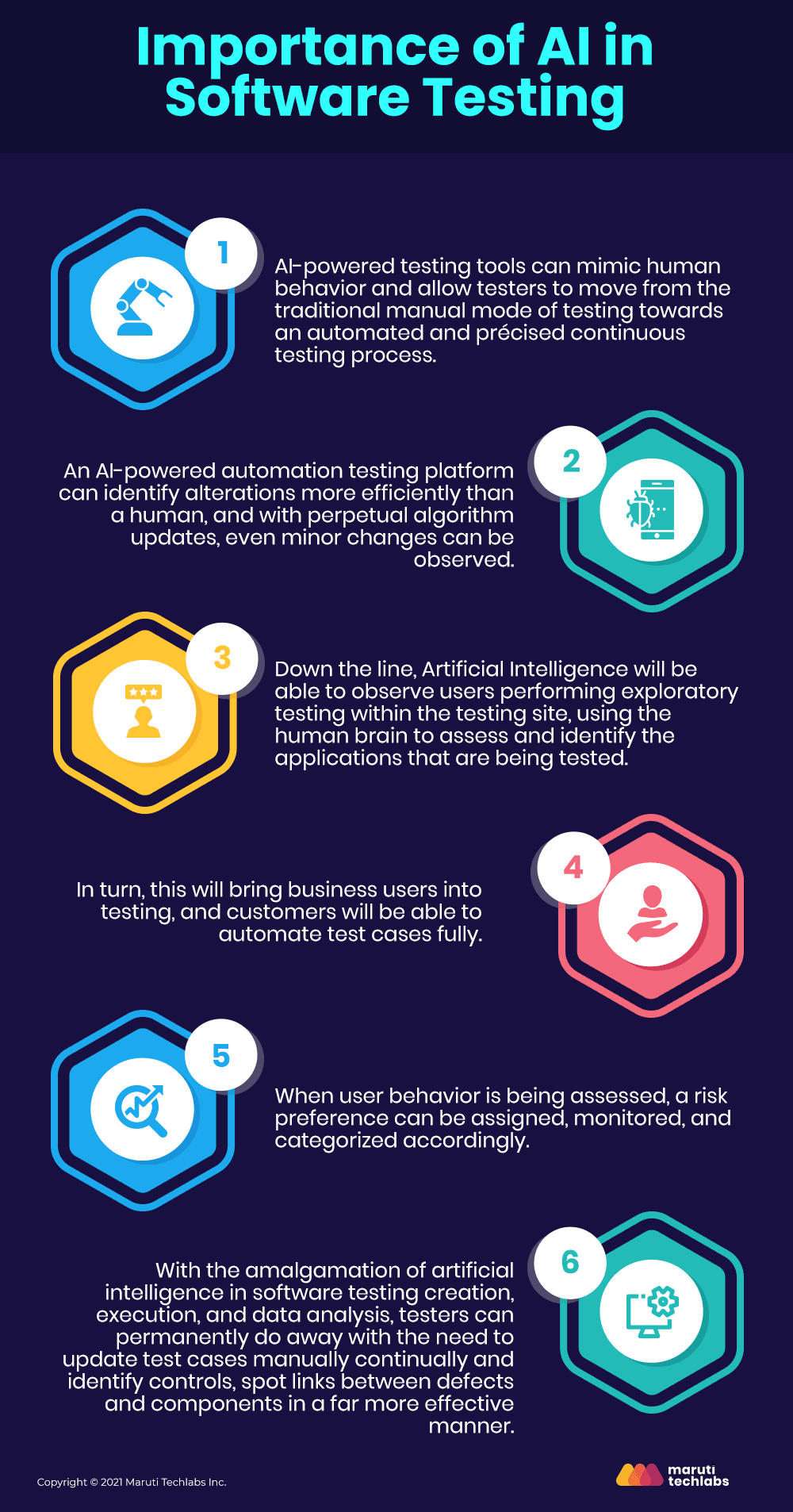
Down the line, Artificial Intelligence will be able to observe users performing exploratory testing within the testing site, using the human brain to assess and identify the applications that are being tested. In turn, this will bring business users into testing, and customers will be able to automate test cases fully.
When user behavior is being assessed, a risk preference can be assigned, monitored, and categorized accordingly. This data is a classic case for automated testing to evaluate and weed out different anomalies. Heat maps will assist in identifying bottlenecks in the process and help determine which tests you need to conduct. By automating redundant test cases and manual tests, testers can, in turn, focus more on making data-driven connections and decisions.
Ultimately, risk-based automation assists users in determining which tests they need to run to get the greatest coverage when limited time to test is a critical factor. With the amalgamation of artificial intelligence in software testing creation, execution, and data analysis, testers can permanently do away with the need to update test cases manually continually and identify controls, spot links between defects and components in a far more effective manner.
Here are 11 salient advantages of artificial intelligence in software testing:
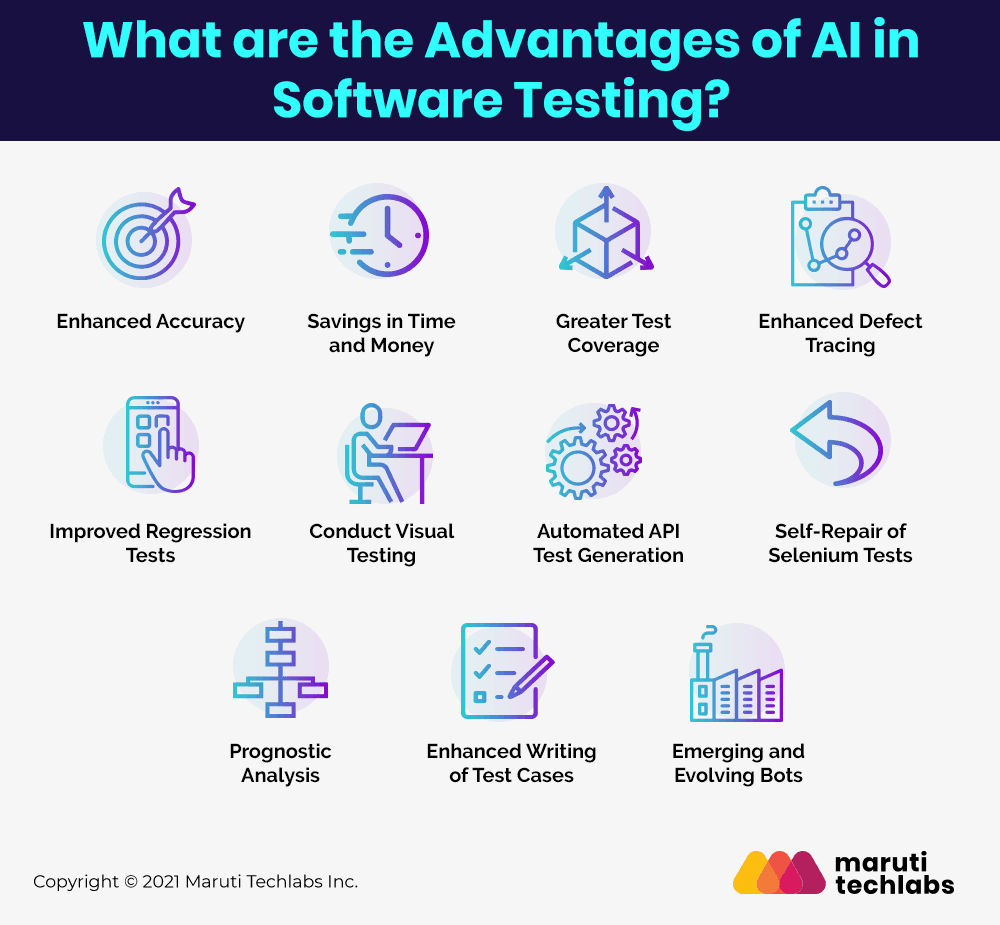
Humans can make mistakes while doing the same monotonous job daily, but a machine will never fail to capture, record, and analyze accurate data with improved efficiency. Testers will be free from manual tests, and they can utilize this time in developing more advanced and sophisticated AI testing features.
Manual testing involves repetitive work every time the source code is modified. It is time-consuming as well as costly. On the contrary, an AI-based testing solution can perform these steps frequently and with no additional cost. The timespan of software testing is reduced, and it also fuels cost optimization.
With AI-based automated testing, one can increase the overall depth and scope of tests resulting in overall software quality improvement. It results in improvement of software quality. AI testing can deep dive into the memory, file contents, internal program statistics, and data tables to figure out the software’s optimum performance. AI tests can run numerous tests simultaneously, giving more extensive coverage, which may not be possible with manual testing.
In conventional and manual testing methods, bugs and errors remain unnoticed for a long time and create hindrances in the future. Artificial intelligence in software testing can trace flaws spontaneously. As the software grows, data increases, and thereby the number of bugs increases. Artificial Intelligence outlines these bugs quickly and automatically so that the software developing team can operate smoothly. AI-based bug tracking identifies fingerprints of failures and perceives duplicate errors.
With progressive and rapid deployment, there is a faster requirement of regression tests beyond human capacity. Artificial Intelligence can perform tedious regression tests. Organizations can adopt Machine Learning to create test scripts. For example, in a User Interface change, an AI-based operation can scan for any overlaps. AI can also be used to validate the alterations that may otherwise be difficult in manual testing.
The AI-based solution helps in the visual validation of web pages and can test different contents on the user interface. These tests are difficult to validate as it requires human involvement in judging the design. Automation testing can take screenshots, measure load time, and many more functions which otherwise may be difficult for an individual human to point out. AI testing eliminates manual struggles of updating the Document Object Model, framework building, and summarising risks.
API testing automation allows users to develop multiple test cases for API quality assurance and estimate the operation of numerous third-party tools. Few services use hundreds of APIs, for which automation is mandatory. AI-based tools are designed in a way that analyses the large volume of data and quickly assesses whether the API is functioning correctly or not. API testing in product development ensures communication quality between programs that communicate via databases and servers and use different protocols.
Selenium tests are productive testing frameworks. But at times, they are complex, time-consuming, and even a minor technical glitch can result in loss of test case progress. The AI-based solution automatically identifies such errors and facilitates self-repair. It also gives intelligent technical insights to improve other testing processes.
Artificial Intelligence testing can utilize the existing customer data and analytics data to determine how users’ demands and browsing behaviors will evolve in the future. It ensures that the software testers and developers are one step ahead of the user and their demands. With AI-based solutions, there will be better service quality and improved prediction of growing needs.
AI will improve the quality of your test cases for automation testing. Artificial Intelligence will offer real test cases that are quick to operate and easy to regulate. The traditional method does not allow the developers to analyze additional possibilities for test cases. With the help of AI, project data analysis happens in a few seconds, and therefore it will enable the developers to figure out new approaches to test cases.
As the test runs, AI detects the change in codes. With alterations in code, AI bots emerge and evolve by learning new application functions. As a result, the AI bots learn with it simultaneously, and hence the quality of the product also improves.
It is clear to you that how does AI help in testing and that the initiation of AI is unavoidable, so let us have a glance at various AI-based automation tools:

Eggplant AI uses intelligent algorithms to circumnavigate software, track defects, and solve technical issues with enhanced data correlation. It gives a graphical analysis of tests and results.

Applitools is an AI-powered visual testing tool. Applitools provides a visual comparison algorithm to trace and report any differences found in the user interface of an application. This tool is efficient in finding thousands of interface inconsistencies in a few minutes.
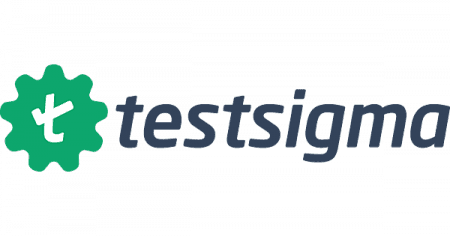
Testigma identifies the relevant test cases for the test run and avoids unprecedented failures. It utilizes a natural language testing process to write automated quality tests. Testigma is suitable for continuous automated testing.
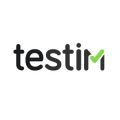
This tool uses ML for the authoring, execution, and maintenance of automated tests. Testim.io emphasizes functional end testing and user interface testing. The tool becomes smarter with more runs and increases the stability of test suites. Testers can use JavaScript and HTML to write complex programming logic.

Appvance makes use of Artificial Intelligence to generate test cases based on user behaviour. The portfolio of tests comprehensively covers what actual end-users do on production systems. Hence, this makes it 100% user-centric.
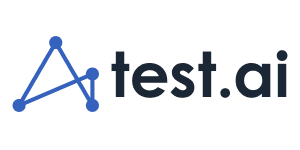
Test.ai is mobile test automation that uses AI to perform regression testing. It helps get the performance metrics on your application and is more of a monitoring tool than a functional testing tool.

Functionize uses machine learning for functional testing and is very similar to other tools in the market regarding its capabilities, such as creating tests quickly (without scripts), executing multiple tests in minutes, and carrying out in-depth analysis.
Artificial Intelligence in software testing is not a remedy that miraculously eliminates all your testing problems. However, there are several ways by which it can provide business value by helping you test smartly and more efficiently.
AI will take over the repetitive tests that currently require human intervention. However, AI will not replace humans entirely. Humans will still need to manage test results, setups, etc. By working in unison with artificial intelligence, QA testers will be able to scale testing while saving costs and bringing higher ROIs.
Artificial Intelligence is making its way into the software development lifecycle with every passing day, and organizations are pondering over the adoption of this technology in their product engineering functions.
There is an initial investment involved, and once an AI system has been set up, organizations will produce better testing rewards at a low cost. This cost-saving can easily be redirected towards quality assurance, exploratory testing, and creative segments of software testing.
Whether you are looking for a guide on e-commerce website testing or need help with continuous improvement in software testing, Maruti Techlabs is here to help you with all your QA needs. We provide a full spectrum of Quality Assurance and Quality Engineering services for your web and mobile applications. Our QA team ensures that your business processes meet rigorous quality checks to ensure consistent functioning and flawless performance at every stage.
Curious about where your organization stands in adopting AI? Use our AI Readiness Calculator
to evaluate your preparedness and identify the next steps toward AI-powered software testing.
For all your QA needs, get in touch with us here.


